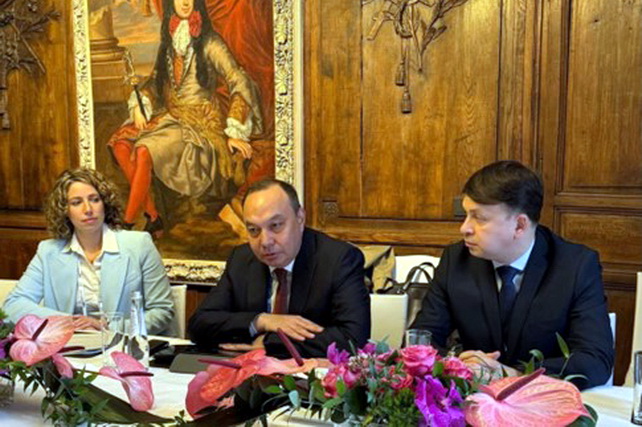
Eldor Aripov: Uzbekistan to become a center for climate dialogue in Central Asia and the EU
Eldor Aripov: Uzbekistan to become a center for climate dialogue in Central Asia and the EU
Tashkent, Uzbekistan (UzDaily.com) — From 14 to 16 February, the 61st Munich Security Conference was held in Germany, with the central theme being "Multipolarity." This annual international forum brought together nearly sixty heads of state and government, over one hundred fifty foreign and defense ministers, as well as leaders of major international organizations. In total, more than eight hundred participants attended the conference, including experts, business representatives, and members of non-governmental organizations.
As part of the event, a panel discussion titled "The Caspian Dilemma: Rethinking Climate and Conflict in Eurasian Security" took place, with Eldor Aripov, the Director of the Institute for Strategic and Interregional Studies under the President of the Republic of Uzbekistan, as the key speaker. He focused on the climate challenges facing Central Asia, emphasizing that the region is one of the most vulnerable to climate change.
Aripov provided data showing that over the last thirty years, the temperature in Central Asia has risen twice as fast as the global average: it increased by 1.5 degrees Celsius in the region, compared to only 0.7 degrees globally. He highlighted the serious risks for the countries of the region, including accelerated land degradation covering 37% of the territory, intense glacier shrinkage (with volumes reduced by 30% over the last 50-60 years), and the growing water shortage. Additional challenges are linked to demographic growth: it is projected that by 2050, the population of Central Asia will reach 100 million people. According to the World Bank, the cumulative impact of these factors may reduce agricultural yields in the region by 30%.
Despite significant environmental threats, the countries of Central Asia struggled for a long time to develop a unified approach to addressing environmental issues. However, as Aripov emphasized, the situation has drastically changed in recent years: skepticism, mistrust, and competition have given way to constructive cooperation, mutual understanding, and the willingness to seek joint solutions. A key factor in this change has been Uzbekistan’s new foreign policy strategy under President Shavkat Mirziyoyev, who declared the principle of "zero problems with neighbors." This became the foundation for strengthening regional cooperation and establishing a unique model of intergovernmental interaction.
In Aripov’s view, climate change and water scarcity have become catalysts for regional partnership. In this context, the water-climate dialogue platform was launched, the Central Asian University for Environmental Studies and Climate Change (Green University) was established, the regional "Green Agenda" for Central Asia was adopted, and a regional climate adaptation strategy was approved.
Moreover, the countries of the region are actively coordinating their efforts on international platforms. During the UN Climate Summit in Dubai, a Central Asian Regional Pavilion titled "5 Countries – 1 Region – 1 Voice" was organized, bringing together all Central Asian nations and enabling them to present a unified stance on key climate issues.
Speaking about national initiatives, Aripov noted that Uzbekistan is focused on achieving ecological sustainability and economic growth by transitioning to a resource-efficient "green" development model. Water-saving technologies have already been implemented on 2 million hectares of irrigated land, accounting for 46% of agricultural land. Over the past five years, modern energy capacities totaling 9.6 gigawatts have been put into operation, and by 2030, the share of renewable energy sources is planned to increase from 16% to 54%.
However, the region faces serious challenges, one of which remains the lack of financial resources for transitioning to climate-neutral technologies and adapting to the effects of climate change. According to the World Bank, at least $20 billion will be needed in the next 5-10 years to modernize energy infrastructure and expand the use of renewable energy sources.
In this regard, Aripov believes that priority tasks include attracting investments, implementing innovative technologies, and preparing qualified specialists in the water-energy sector. These issues will be discussed during the "Central Asia – European Union" summit and the Central Asia Global Climate Challenges Conference, both of which will take place this year in Uzbekistan. In conclusion, the expert expressed confidence that Uzbekistan could become a key platform for uniting regional efforts and international partners in the fight against climate change.
The Munich Security Conference, first held in 1963, is the leading global forum for discussing international policy and formulating diplomatic initiatives aimed at addressing the most pressing global challenges. It brings together state leaders, ministers, international organizations, as well as leading businesspeople, scholars, media representatives, and civil society members.